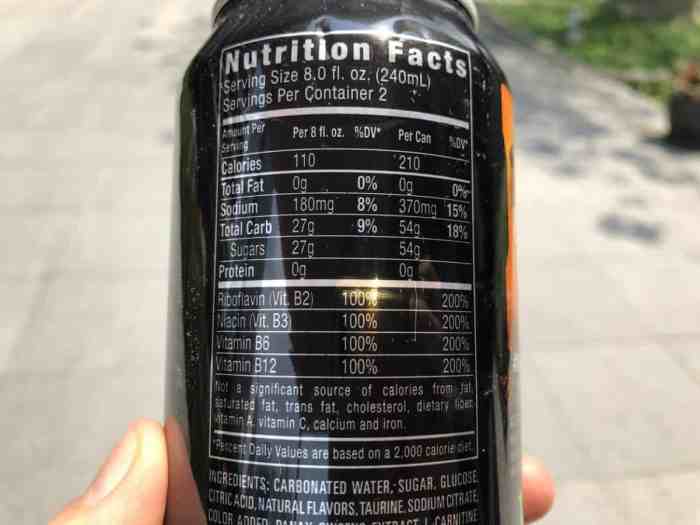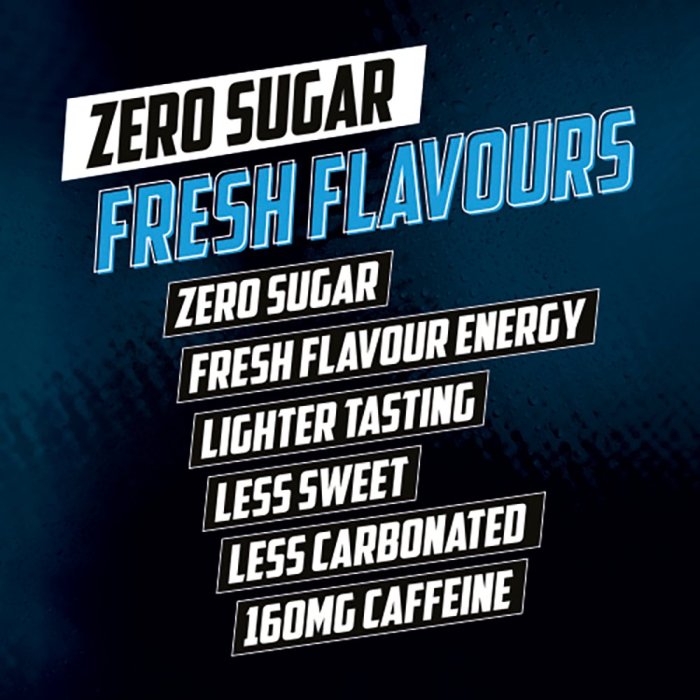Caffeine Content and Effects

Nutrition facts of monster energy – A standard 16-ounce can of Monster Energy contains approximately 160 milligrams (mg) of caffeine. This significant amount warrants a detailed examination of its potential effects on the body, both short-term and long-term, and a comparison to other common caffeinated beverages.
We’re dissecting the nutritional profile of Monster Energy, a drink often scrutinized for its high sugar and caffeine content. But let’s consider the other end of the spectrum: a seemingly healthier choice like guacamole, and if you’re curious about the specifics, check out the detailed breakdown of nutrition facts chipotle guacamole to see how it compares.
Returning to Monster, understanding these nutritional contrasts highlights the importance of mindful consumption and balanced dietary choices.
Caffeine’s Physiological Effects
Caffeine acts as a central nervous system stimulant. Upon consumption, it quickly enters the bloodstream and blocks adenosine, a neurotransmitter that promotes relaxation and sleepiness. This blockage leads to increased alertness, improved focus, and enhanced energy levels. However, the intensity and duration of these effects vary depending on individual factors such as metabolism, body weight, and prior caffeine tolerance.
The body’s response also depends on factors like the individual’s overall health and any pre-existing conditions. For example, individuals with anxiety disorders might experience heightened anxiety, while those with heart conditions might experience palpitations.
Short-Term and Long-Term Effects of High Caffeine Consumption
Short-term effects of high caffeine intake can include increased heart rate, elevated blood pressure, anxiety, restlessness, insomnia, and digestive upset. These effects are usually temporary and subside once the caffeine is metabolized. However, consistent high consumption can lead to long-term consequences. Chronic high caffeine intake is associated with an increased risk of developing tolerance, meaning that progressively larger amounts are needed to achieve the same effect.
This can lead to a dependence and withdrawal symptoms such as headaches, fatigue, and irritability upon cessation of consumption. Moreover, some studies suggest a link between excessive caffeine intake and long-term health issues.
Caffeine Comparison: Monster Energy vs. Coffee and Tea
A 16-ounce Monster Energy contains roughly the same amount of caffeine as a 16-ounce cup of brewed coffee, but this can vary greatly depending on the type of coffee bean and brewing method. A typical 8-ounce cup of coffee contains approximately 95-200 mg of caffeine. Tea generally contains less caffeine; an 8-ounce cup of black tea usually contains around 47 mg, while green tea contains approximately 28 mg.
It is crucial to note that these are average values and can differ substantially. Therefore, direct comparisons require careful consideration of the specific product and brewing methods.
Health Risks Associated with Excessive Caffeine Intake
Excessive caffeine consumption is linked to several potential health risks. The following list highlights some of the key concerns:
- Increased risk of cardiovascular problems, such as palpitations, arrhythmias, and increased blood pressure.
- Anxiety and restlessness.
- Insomnia and sleep disturbances.
- Digestive issues, including heartburn, stomach upset, and diarrhea.
- Dehydration.
- Headaches and migraines.
- Nutrient deficiencies, as caffeine can interfere with the absorption of certain nutrients.
It’s vital to remember that individual responses to caffeine vary widely. What might be a moderate amount for one person could be excessive for another. Consulting a healthcare professional is advisable for personalized guidance on safe caffeine consumption levels.
Sugar Content and its Implications: Nutrition Facts Of Monster Energy

Monster Energy drinks contain a significant amount of sugar, contributing to various health concerns. Understanding the type and quantity of sugar, and its impact on the body, is crucial for informed consumption choices.
A standard 16-ounce can of Monster Energy typically contains around 54 grams of sugar. This sugar is primarily in the form of high-fructose corn syrup and sucrose. This level of sugar is considerably high compared to recommended daily intakes and contributes significantly to the overall caloric density of the beverage.
High Sugar Consumption’s Impact on Overall Health, Nutrition facts of monster energy
Excessive sugar consumption is linked to a wide range of adverse health effects. The body processes sugar rapidly, leading to spikes in blood glucose levels, which can overwork the pancreas and increase the risk of developing insulin resistance. This, in turn, can lead to type 2 diabetes, a serious chronic condition affecting millions worldwide. Beyond diabetes, high sugar intake is also associated with increased risk of cardiovascular disease, due to its contribution to elevated triglyceride levels and inflammation.
Furthermore, high sugar diets are frequently linked to non-alcoholic fatty liver disease and certain types of cancer.
Sugar Intake, Weight Gain, and Related Health Issues
The link between high sugar consumption and weight gain is well-established. Sugary drinks, like Monster Energy, provide “empty calories,” meaning they offer minimal nutritional value while contributing significantly to overall caloric intake. These excess calories are readily stored as fat, leading to weight gain and potentially obesity. Obesity, in turn, increases the risk of numerous health problems, including heart disease, stroke, certain types of cancer, and osteoarthritis.
The high sugar content in Monster Energy, therefore, contributes directly to this cycle of weight gain and associated health risks. For example, consuming one Monster Energy can daily, in addition to a normal diet, could easily lead to a weight gain of several pounds over a month or more, depending on individual metabolic rates and activity levels.
Visual Representation of Sugar Content
Imagine a bar graph. One bar represents the sugar content of a 16-ounce can of Monster Energy, visually depicted as a tall bar reaching approximately 54 units high. A second, much shorter bar represents the recommended daily added sugar intake for adults, typically around 25 grams or less, according to the American Heart Association. This visual comparison clearly illustrates the significant excess of sugar in a single can of Monster Energy compared to recommended daily limits.
The difference between the two bars dramatically highlights the potential health implications of regular consumption. The visualization emphasizes the disproportionate amount of sugar in relation to daily guidelines, serving as a stark reminder of the potential health consequences.
FAQ Insights
Does Monster Energy contain artificial sweeteners?
While specific formulations vary, many Monster Energy drinks do not contain artificial sweeteners. Their sweetness primarily comes from sugar.
How does Monster Energy compare to Red Bull in terms of nutritional content?
Nutritional content varies between specific Monster and Red Bull flavors. A direct comparison requires examining the nutritional information panels of the individual products.
Are there any long-term studies on the effects of regular Monster Energy consumption?
Long-term studies specifically on Monster Energy are limited. However, research on high caffeine and sugar intake generally indicates potential negative effects on cardiovascular health, weight management, and other aspects of well-being.
Can Monster Energy be part of a healthy diet?
Occasional consumption may be acceptable for some individuals, but regular consumption of Monster Energy is generally not considered part of a healthy diet due to its high sugar and caffeine content. Moderation is key.
